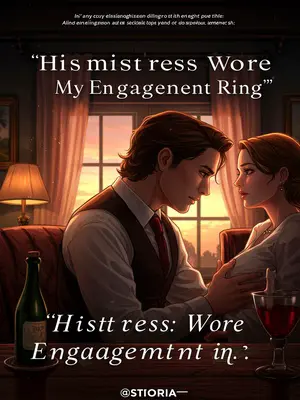Chapter 2: Roots and Small-Town Ties
Two
Derek and I are childhood friends—we met when we were three.
There are faded Polaroids of us, drooling toddlers in matching OshKosh overalls, crawling across his parents’ living room carpet. I still remember the cheap plastic tricycles, the swing set with a missing chain, Little League Saturdays at the park, Dairy Queen runs on hot nights, and the smell of Mr. Peterson’s backyard grill on summer evenings.
His parents and mine had been friends for over a decade, living in the same apartment complex, right across the hall.
Our moms traded casseroles and laundry tips; our dads watched college football together every Sunday. We grew up as unofficial siblings, our lives stitched together by Sunday dinners, Fourth of July barbecues, and the county fair every fall.
I’d liked Derek since I was little.
He was the first boy who didn't make fun of my lisp or my obsession with sparkly shoes. Even back then, his crooked grin could make me forget the world.
In elementary school, I was always bullied by boys.
It started small—name-calling, a nudge in the lunch line—but by second grade, I’d learned to dread recess. My pink backpack and matching lunchbox made me a target. I still have my third-grade class photo, the scab on my elbow from a push off the monkey bars hidden just out of frame.
One boy was the worst—he’d pull my hair from the seat behind, stick chewing gum on my chair, even put little firecrackers in my desk.
He was the kind of kid teachers called “spirited,” but I knew better. His tricks left me with sticky hair, ruined school supplies, and a permanent knot in my stomach before every Monday morning. When the firecrackers popped, the principal called home and had a talk with our class about safety.
I cried and told the teacher. The teacher scolded him, but then laughed and said he probably did it because he liked me.
Her words stung, and the boys in class just laughed harder. I learned early that adults didn’t always take my pain seriously—and maybe that’s why I later tolerated too much from Derek.
I didn’t believe it. The boy didn’t stop, so I told my parents again when I got home.
That night, sitting at the kitchen table with a glass of chocolate milk, I finally let the tears fall. My mom's face hardened, and Dad muttered something about "boys needing to learn respect." The school called back the next day, promising to “monitor the situation.”
My parents were furious and wanted to talk to the teacher right away. Mr. Peterson happened to be visiting, and when he heard, he called Derek over and told him to look out for me at school from then on.
Mr. Peterson had a way of making things happen. He ruffled Derek's hair, handed him a juice box, and gave him a pep talk about keeping an eye out and telling an adult if he saw anything.
Derek and I were the same age but not in the same class at the time. The next day during break, Derek came to my class and pulled that boy into the hallway.
He didn’t hesitate, even when the kid was bigger than him. A coach stuck his head out from the gym office and broke it up fast, but the message landed anyway. Word spread quick—Derek Peterson didn’t let anyone mess with his friends.
He was tall even as a kid, with a tough personality. He beat that boy and his friends until they cried.
I watched from the window, clutching my books, heart pounding. The nurse patched them up and the boys got detention; Derek cooled off in the office. I’d never felt so protected.
Before leaving, he warned the other boys,
"If anyone dares bully Natalie again, just wait!"
The words echoed in the hallway long after he left. For the first time, I walked back to class without looking over my shoulder.
That was when I started liking him.
My cheeks turned hot every time he looked at me, and I started doodling his name in the margins of my notebooks. My mom caught me once and just smiled.
After that, I became his little shadow, following him everywhere.
I was the girl tagging along at his basketball games, waiting at the fence after school, trailing him like a duckling. Even when he tried to shake me, I showed up—rain, shine, or snow days.
Derek didn’t like me tagging along—he was pretty macho, thinking it was unmanly to hang out with a weak girl all day.
He rolled his eyes when his friends teased him, always muttering, "Go home, Nat, don't you have dolls to play with?" But he never told me to leave for good.
But I was persistent, always chasing after him and calling him "Derek."
He’d pretend to be annoyed, but sometimes, when he thought I wasn’t looking, he smiled. I knew, deep down, he didn’t really mind.
The years went by, and he gradually softened, not pushing me away so much anymore.
We shared headphones on the bus, played video games in his living room, ate ice cream on the stoop after school. He started waiting for me, slowing down when I lagged behind.
I started to notice that his gaze lingered on me longer, and when our eyes met, sometimes he’d get flustered, stammer, and his cheeks would turn red as he changed the subject.
It made my heart do somersaults. For a while, I thought maybe, just maybe, he liked me back. Those were the best years—when everything felt possible.
Mr. Peterson once joked that since the two kids got along so well, why not arrange a childhood engagement?
Everyone at the table laughed. My dad raised his eyebrows, and my mom joked about shopping for wedding cakes. There was peach cobbler on the table and the Sunday NFL game droning in the background. I pretended to be annoyed, but I secretly loved it.
Derek didn’t say anything, but he held my hand tightly. I saw his ears turn red.
I squeezed back, holding onto that moment like it was a secret wish come true. I dreamed about it for weeks.
My heart felt sweet, and I said loudly, "Okay! I want to marry Derek!"
The grownups cheered, and I beamed. Derek didn’t let go of my hand, not even once.
But after we started high school, everything began to change.
It was as if we crossed an invisible threshold—one day we were kids, the next we were strangers sharing the same hallway.
At the end of the first semester of freshman year, a transfer student joined our class.
I remember the buzz in the hall, everyone whispering about the new girl, the one with the fancy hair and the city attitude.
Her name was Lauren. Rumor had it she transferred because of her parents’ jobs. She had great grades and a bright, beautiful face.
She showed up on the first day wearing trendy sneakers, hair bouncing, and a confidence I could never fake.
On her first day, she showed up with chestnut curls and smiled at the homeroom teacher.
She looked like she belonged on the cover of a magazine, not in our faded, poster-strewn classroom. Ms. Ramirez smiled back, clearly impressed.
"Ms. Ramirez, this is natural—my hair is naturally light and curly."
She said it loud enough for everyone to hear, tossing her curls so the sunlight caught them just right. Some girls rolled their eyes. The boys stared.
Then she turned and glanced around the class. When she saw me, she paused, stared for a moment, and suddenly burst out laughing.
Her laughter rang out, sharp and loud, making my cheeks burn. I shrank in my seat, wishing I’d worn something—anything—other than pink that day.
"Oh my god... where did this Barbie princess come from... hahahaha. Everything is pink, seriously? Already in high school and still playing cutesy? So embarrassing."
Her words sliced through the air. I looked down at my pink sweater, the matching scrunchie on my wrist, and wanted to disappear.
The whole class looked at me.
Every face turned my way, eyes wide with amusement or pity. I could feel their stares, heavy and unforgiving. I fiddled with my sleeves, trying to shrink into my chair.
My face turned bright red on the spot.
I could feel the heat crawling up my neck, my ears burning. It was like being caught in a nightmare where everyone laughs and you can't wake up.
I like pink—a lot. Almost everything I own is pink: backpack, cup, hair clip, t-shirt, sweater, phone case, even the little trinkets.
It's just who I am. My room at home is a bubblegum daydream, my bedspread a collage of hearts and polka dots. I always thought it made me unique, but suddenly it just made me visible.
Because of this, people have talked about me. In elementary school, boys called me fake and delicate, and some girls said I was just pretending to be cute.
I learned to ignore the whispers—until now. Until Lauren, who said it all out loud, right to my face.
But most people were nice. More girls told me I was super cute and that pink really suited me.
They’d compliment my accessories, borrow my pink pens during class, invite me to their birthday parties. I tried to hold onto that, even as Lauren's words echoed in my head.
This was the first time I’d ever been so bluntly, openly ridiculed in public. I was embarrassed and confused, wishing I could disappear.
I ducked my head, blinking fast, and bit the inside of my cheek. I could feel the tears prickling behind my eyes, but I refused to let them win.
"Hahaha, sorry, I just speak my mind. Don’t be mad, little princess."
She flashed me a sugary smile, like she was doing me a favor by pointing out my flaws. I wanted to disappear.
Lauren blinked playfully.
She winked at the boys, tossing her hair again. I could feel my heart beating in my throat.
"Alright, it’s your first day, keep it down," Derek’s impatient voice rang out. I turned to see him frowning at Lauren, looking annoyed.
He leaned back in his seat, arms crossed. I felt a flicker of hope—maybe he’d stick up for me, like always.
Lauren raised her eyebrows and stared at Derek.
She gave him a slow, appraising look, like she was sizing him up for something. A smile tugged at her lips.
"Oh? The princess’s knight is here?"
She said it loud enough for everyone to hear. The class snickered again, and my hope deflated a little.
"What are you talking about? Are you serious right now?"
Derek slammed the desk, angry.
His voice echoed in the room, making everyone jump. For a second, I saw a flash of the old Derek—the one who’d defend me no matter what.
The teacher quickly scolded him and told him to sit down, then assigned Lauren to the only empty seat.
I could tell she liked the attention. She tossed her bag on the desk with a practiced flick and gave everyone a dazzling smile.
Whether it was a coincidence or not, the only empty seat was right in front of Derek. So, they became seat neighbors.
I watched them from across the room, an uneasy feeling settling in my stomach. It was the start of something I couldn't control.













